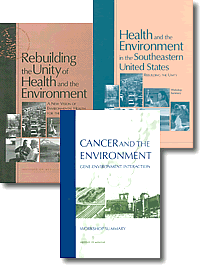A number of Environmental and Energy Management program and other environmental graduate students and faculty members participated in a workshop entitled “From Source Water to Drinking Water: Emerging Challenges for Public Health” on October 16, 2003. The event was held at the National Academy of Sciences building on Constitution Avenue and 22nd Street, N.W., just one block from the GW campus. The workshop was the fifth in a series of environmental and health workshops conducted by the National Academy of Sciences/Institute of Medicine under the series title “Roundtable on Environmental Health Sciences, Research, and Medicine.” Co-sponsors of the events included the Environmental Protection Agency, National Institute of Environmental Health Sciences, National Center for Environmental Health, Agency for Toxic Substances and Disease Registry, National Institute for Occupational Safety and Health, National Health and Environmental Effects Research Laboratory, National Center for Environmental Research, Exxon-Mobil Corporation, and the American Chemistry Council
The Roundtable on Environmental Health Sciences, Research, and Medicine was established to provide a mechanism for parties interested in environmental health from the academic, industrial, and federal research perspectives to meet and discuss sensitive and difficult issues of mutual interest in a neutral setting. The purpose is to foster dialogue and discussion among sectors and institutions and to illuminate issues.
The October 16 event focused on the interdependency between water supplies and humans. The workshop examined issues that are most likely to be critical for protecting our water supplies from source water to drinking water. Speakers and participants at the event were asked to consider the broadly defined environment—one that includes the natural, built, and social environment—and to identify those areas that will impact the world’s ability to ensure safe water for our health needs.
Included among the participants from GW were graduate students Bruk Berhane, Ed Hagarty, Scott Christian, Anita Makri, and Lisa Ragain, and professors Jonathan Deason, and Sarin Prim.


